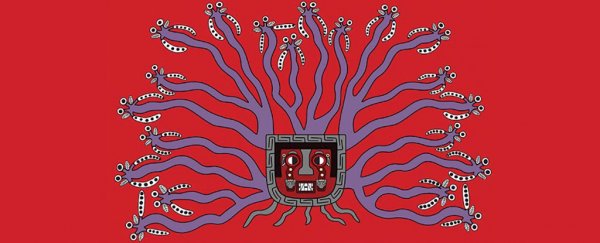The ancient Wari empire of Peru might have used hallucinogenic beer to rally support in new territories.
The remnants of a large feast, found at a Wari outpost from the ninth century CE, strongly suggest the seeds of a psychoactive plant called vilca (Anadenanthera colubrina) were once mixed with chicha, a beer made from the fruit of a Peruvian peppertree (Schinus molle), to create a rather… special beverage.
The drink would probably have triggered a mellow, psychedelic state among guests, which archaeologists suspect included commoners from the region.
Such egalitarian distribution of hallucinogens is unlikely to have been the case in older pre-Columbian periods, with the elite holding onto psychoactive substances as a means of spiritual authority.
But by the 'Late Horizon' epoch of the Wari empire, psychotropic substances were no longer used to identify a political elite. This means at some point, hallucinogens crossed a significant class divide.
The authors of this new study now speculate on a possible reason: By combining a hallucinogen with alcohol, the Wari leaders may have been trying to win over their new subjects at the Quilcacampa site.
The vilca seeds found here, in southern Peru, were precious resources in the time of the Wari, found on trees that grew 400 kilometers (250 miles) away, deep in the mountains. As such, these seeds were mostly available to political or religious leaders, who had the means to order harvesting expeditions.
The researchers point out that as the Wari empire expanded, their architecture increasingly included feasting spaces that would emphasize the hospitality of the hosts.
While a potent beer made from the peppercorns (also known as molle fruit) had been shown to be on the menu, the addition of vilca has only been speculated. By mapping the distribution of molle and vilca botanical samples, the team has built a stronger case for vilca's use across traditional social boundaries.
Sharing the psychedelic substance would have been a calculated decision on the Wari's part. The spiritual and communal feelings induced by the beverage might have been used to spread a new religious order or to create a sense of cohesion.
"The experience, however, could not be reciprocated by guests, who lacked access to the imported vilca seeds and knowledge of how the drink was prepared," the authors write.
Thus, vilca seeds might have been a powerful tool of persuasion, ensuring the influence of the Wari empire as it expanded into new lands.
 Vilca seeds from Quilcacampa. (M. Biwer)
Vilca seeds from Quilcacampa. (M. Biwer)
Instead of grinding up the seeds and snorting them (the preferred method of ingestion for Wari elites), archaeologists think commoners were offered the seeds in chicha, which is argued to contain compounds that could have enhanced the psychotropic effects.
Some beer vessels at other Wari sites in Peru are actually illustrated with vilca pods, which suggests this was a common practice elsewhere in the empire, too.
Later, when the Inca Empire arrived on the scene circa CE 1450, vilca seeds seem to have fallen out of use as a political tool, though they continued to be smoked in the region for a millennium. But beer stuck around.
Archaeological evidence suggests Inca leaders hosted feasts with plenty of chicha to bestow a sense of community cheer. Perhaps they were going for a different strategy than the Wari empire, which began to deteriorate around 800 CE.
Try as they might, it seems no amount of vilca seeds could save the civilization.
The study was published in Antiquity.
